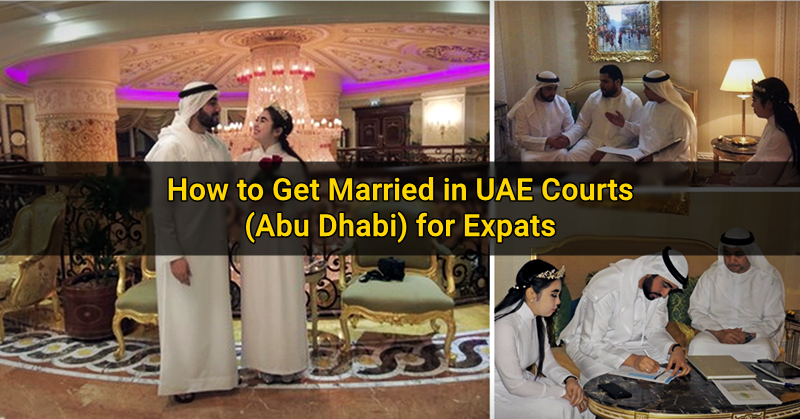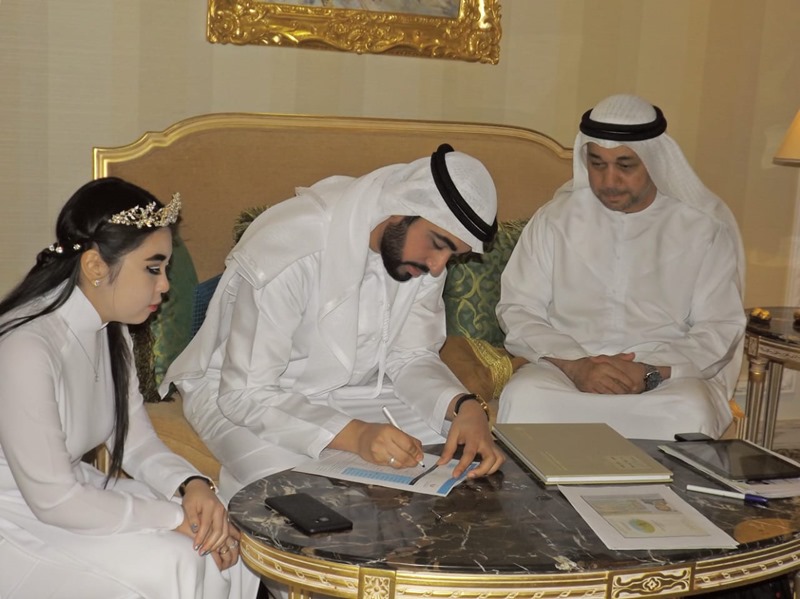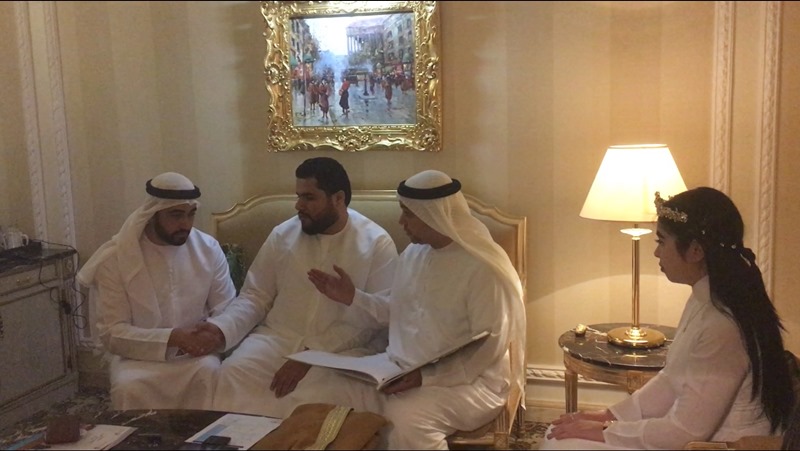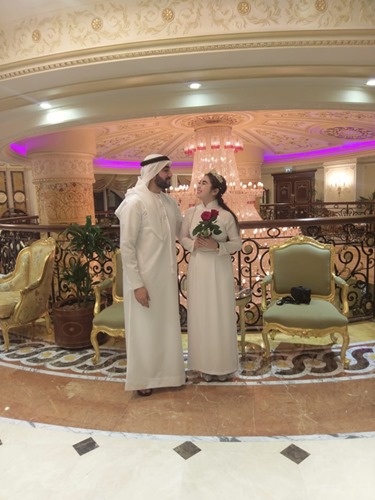Expats in the UAE who have different nationalities and are planning to get married in the UAE courts, here is a guide shared by one of our contributors when she (Filipina) and her boyfriend (Egyptian) tied the knot in Abu Dhabi Courts.
Note: This guide is based on the author’s experience. We hope you find her guide useful especially to interracial couples planning to get married in the UAE.
Also Read: Getting Married in Seychelles for UAE Expats

————————————————————————
My husband and I got married last month in the Abu Dhabi Courts, a year and a half after he proposed. It took us exactly 1 week to prepare for the actual wedding day, while the rest of those 18 long months were spent on preparing the required documents (most, if not all, were from my side).
Getting married in the UAE may seem like a long, complicated process, but it’s not as impossible as some people would have you believe.
Bride’s and Groom’s Profiles
| Bride’s Profile | Groom’s Profile | |
|---|---|---|
| Age | 25 | 28 |
| Nationality | Filipino | Egyptian |
| Religion | Christian (Roman Catholic) | Muslim |
| Civil Status | Single | Single |
| Visa Status | Employment Visa (Dubai) | Employment Visa (Dubai) |
| Current Residence | Dubai | Abu Dhabi |
Requirements
Bride’s Requirements
- Valid Passport (Original and copies)
- Valid UAE Visa (Original and copies)
- Emirates ID (Original and copies)
- Passport-sized photos
- Birth Certificate (issued by the Philippine Statistics Authority)
- Affidavit of Consent (attested by: (1) the Philippine Department of Foreign Affairs and (2) the UAE Embassy of Manila)
- Legal Arabic translation of the Affidavit of Consent (attested by: (1) the UAE Ministry of Foreign Affairs and (2) the UAE Ministry of Justice)
- Certificate of No Marriage/CENOMAR (issued by the Philippine Statistics Authority and attested by: (1) the Philippine Department of Foreign Affairs and (2) the UAE Embassy of Manila)
Legal Arabic translation of the CENOMAR (attested by: (1) the UAE Ministry of Foreign Affairs and (2) the UAE Ministry of Justice) - Pre-Marital Medical Certificate
Groom’s Requirements
- Valid Passport (Original and copies)
- Valid UAE Visa (Original and copies)
- Emirates ID (Original and copies)
- Passport-sized photos
- Pre-Marital Medical Certificate
Contents
- Guide to Getting Married in UAE (Abu Dhabi Courts)
- Step 1: Request for an original Birth Certificate and Certificate of No Marriage (CENOMAR).
- Step 2: If your father cannot physically attend the wedding, ask him to prepare an Affidavit of Consent.
- Step 3: Bring the notarized Affidavit of Consent for attestation to the Regional Trial Court.
- Step 4: Have your CENOMAR and Affidavit of Consent authenticated by the Philippine Department of Foreign Affairs (DFA).
- Step 5: Have your CENOMAR and Affidavit of Consent authenticated by the UAE Embassy of Manila.
- Step 6: Have your authenticated CENOMAR and Affidavit of Consent legally translated in Arabic.
- Step 7: Have your Arabic-translated CENOMAR and Affidavit of Consent authenticated by the UAE Ministry of Foreign Affairs (MoFA).
- Step 8: Visit an accredited health center for a Pre-marital Medical Test.
- Step 9: Have your Pre-marital Medical Certificates, Affidavit of Consent and CENOMAR attested by the UAE Ministry of Justice (MoJ).
- Step 10: Book an appointment with the UAE Courts
Guide to Getting Married in UAE (Abu Dhabi Courts)
Please see the step by step procedure below on how this couple were able to have a wedding in Abu Dhabi Courts:
Step 1: Request for an original Birth Certificate and Certificate of No Marriage (CENOMAR).
- You can either ask a family member to visit their nearest Philippine Statistics Authority (PSA) office or order one online at https://www.psaserbilis.com.ph/Default.aspx
- PSA Serbilis rates:
— Birth Certificate – PHP 330.00/copy (including local shipping charges)
— CENOMAR – PHP 430.00/copy (including local shipping charges) - Don’t select the international order option. You still need to send your CENOMAR to the Department of Foreign Affairs (DFA) and UAE Embassy of Manila for attestation.
- Select the local delivery option. Delivery takes 7-9 working days within Metro Manila and 8-13 working days outside of Metro Manila.
Step 2: If your father cannot physically attend the wedding, ask him to prepare an Affidavit of Consent.
- In the Philippines, persons aged 25 and above do not require their parents’ consent to contract a civil marriage. On the other hand, in Sharia/Court Weddings, your father is your legal guardian, which means his consent is required, regardless of your age.
- In case of death, you need to provide your Father’s Death Certificate, among other requirements.
- Schedule an appointment with a Notary Public to prepare and notarize an Affidavit of Consent.
- The Affidavit of Consent must include the following information:
- Bride’s Father’s
— Full name
— Passport number - Bride’s
— Full name
— Passport number - The Bride’s Father’s explicit mention that his daughter has never been married before (if single) and/or is free to marry (if applicable to the circumstances).
- Bridegroom’s
— Full name
— Passport number - The Wali’s (Legal guardian/proxy in the father’s absence)
— Full name
— Passport number - On the Wedding Day, the Wali will recite the vows in Arabic with the Groom, so it’s best to have a native Arabic-speaking Wali.
- Rates vary. Our lawyer charged us PHP 3,000 for the notarizing the Affidavit of Consent and assisting my dad in his court appearance at the Regional Trial Court (see Step 3).
- Bride’s Father’s
Step 3: Bring the notarized Affidavit of Consent for attestation to the Regional Trial Court.
- Ask your lawyer to schedule your father’s personal appearance at the Regional Trial Court
- A Certificate of Authority for a Notarial Act will be attached to the notarized Affidavit of Consent as proof of attestation.
Step 4: Have your CENOMAR and Affidavit of Consent authenticated by the Philippine Department of Foreign Affairs (DFA).
- This is more popularly known as the “Red Ribbon.”
- This should not be much of an issue if you live in Metro Manila. You can ask any of your relatives to bring the document to DFA Pasay.
- Pro (Probinsyana) Tip: If you, like me, don’t live in Metro Manila, you might want to consider availing LBC’s full document attestation service.
- For AED 300 (per document), they will complete the process for you, right down to shipping the documents back to the UAE.
- To learn more about LBC’s document processing service, visit their website.
Step 5: Have your CENOMAR and Affidavit of Consent authenticated by the UAE Embassy of Manila.
- The UAE Embassy of Manila will not authenticate any document without DFA authentication (“Red Ribbon”).
- They will also not accept walk-in applicants for document attestation. You need to go through DHL Philippines’ document attestation service to do this.
- Pro (Probinsyana) Tip: LBC UAE also offers this service for AED 350 (per document), inclusive of shipping fees.
Step 6: Have your authenticated CENOMAR and Affidavit of Consent legally translated in Arabic.
- Arabic is the official language of the UAE and the language of the law here.
- For this reason, any document submitted for legal purposes should first be translated in Arabic by a Court-authorized translator.
- Rates vary.
Step 7: Have your Arabic-translated CENOMAR and Affidavit of Consent authenticated by the UAE Ministry of Foreign Affairs (MoFA).
- Bring your documents to your nearest MoFA Attestation Center (visit https://www.mofa.gov.ae/EN/Contacts/Pages/Legalization-Centers-contact.aspx for the full list).
- MoFA Attestation rate per document: AED 160 (exclusive of VAT).
Step 8: Visit an accredited health center for a Pre-marital Medical Test.
- The Pre-marital Medical Test is a fairly new requirement for a UAE Court Marriage.
- Its primary purpose is to inform the couple about each other’s health condition and to ensure the well-being of their children.
- Check the Dubai Courts or Abu Dhabi courts website for a list of accredited health centers.
- Walk-ins are usually accepted, provided you bring the following:
— Original and photocopies of Emirates IDs (Bride’s and Groom’s)
— 2 copies of passport-sized photos (Bride’s and Groom’s) - Pre-marital Medical Test rates (in Al Waqtaa Healthcare Center):
— Bride – AED 434
— Groom – AED 382 - You can expect 2 rounds of tests:
— Round 1 – Blood pressure check; Height and weight measurement
— Round 2 – Blood extraction
—– As they will checking for STDs and genetic diseases, they will extract 3 vials each from the bride and the groom. - Medical results are released after 3 days confidentially, which means the bride and the groom should claim their results separately.
- Since I live in Dubai and could not claim my medical result personally, I authorized my husband to claim my result, by signing an authorization letter (provided in the clinic) and giving him my original Emirates ID.
Step 9: Have your Pre-marital Medical Certificates, Affidavit of Consent and CENOMAR attested by the UAE Ministry of Justice (MoJ).
- MoJ Attestation rates (in Abu Dhabi Courts):
— AED 50 per document (exclusive of VAT)
Step 10: Book an appointment with the UAE Courts
- The final (and easiest) step of all.
- Choose a wedding date and call the Courts (we called Abu Dhabi Courts) to schedule an appointment with a Mazoun (legal cleric who officiates Sharia Weddings).
- You can opt for a wedding inside the court between 8:00 a.m. – 2:00 p.m. or outside the court (a venue of your choice) between 2:00-9:00 p.m. My husband and I opted for the latter, so that our wedding guests would not have to take a leave from work.
- Marriage fees:
— Inside the court – AED 300
— Outside the court – AED 500
Don’t forget to bring all your marriage documents on the day of your wedding. (I may be stating the obvious, but my husband very nearly forgot to bring our documents, because he was too busy preparing his kandura!)
Mabrouk and best of luck to you on your big day! Here are some photos during our experience:



To find out more about the bride’s personal wedding preparation experience, visit her ‘An Interracial Expat Couple’s Guide to Marrying in the UAE Courts’ at An Interracial Expat Couple’s Guide to Marrying in the UAE Courts | The Grammar Fuhrerin”
About the Author: Nicholette
 Nicholette retired from teaching hormonal teenagers at the tender age of twenty-two to pursue a career in adulting in Dubai. From an early age, she has struggled with an incurable case of sarcasm, which she now channels through her writing. She reads fiction voraciously, eats anything edible heartily, and travels every chance she gets. She is less of a writer and more of a collector of stories penning her travels, thoughts, and things in between in her inappropriately-titled blog: http://thegrammarfuhrerin.wordpress.com
Nicholette retired from teaching hormonal teenagers at the tender age of twenty-two to pursue a career in adulting in Dubai. From an early age, she has struggled with an incurable case of sarcasm, which she now channels through her writing. She reads fiction voraciously, eats anything edible heartily, and travels every chance she gets. She is less of a writer and more of a collector of stories penning her travels, thoughts, and things in between in her inappropriately-titled blog: http://thegrammarfuhrerin.wordpress.com
Share your thoughts. Contribute an article to DubaiOFW.com
Want to publish your experience? Share your everyday stories, food trips, travel, photo stories, or tips in Dubai to our growing community. More information here – Become a Dubai OFW Contributor